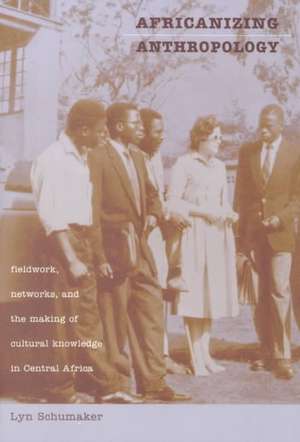Africanizing Anthropology – Fieldwork, Networks, and the Making of Cultural Knowledge in Central Africa
Autor Lyn Schumakeren Limba Engleză Paperback – 11 iul 2001
Preț: 211.18 lei
Nou
Puncte Express: 317
Preț estimativ în valută:
40.42€ • 41.65$ • 34.12£
40.42€ • 41.65$ • 34.12£
Carte disponibilă
Livrare economică 08-22 februarie
Livrare express 25-31 ianuarie pentru 38.27 lei
Preluare comenzi: 021 569.72.76
Specificații
ISBN-13: 9780822326731
ISBN-10: 0822326736
Pagini: 392
Dimensiuni: 152 x 219 x 29 mm
Greutate: 0.64 kg
Ediția:New.
Editura: MD – Duke University Press
Locul publicării:United States
ISBN-10: 0822326736
Pagini: 392
Dimensiuni: 152 x 219 x 29 mm
Greutate: 0.64 kg
Ediția:New.
Editura: MD – Duke University Press
Locul publicării:United States
Cuprins
Acknowledgments
1. “The Water Follows the Stream”
>2. Contexts and Chronologies
3. Archetypal Experiences
4. The Laboratory in the Field
5. “A Lady and an American”
6. Atop the Central African Volcano
7. Africanizing Anthropology
8. The Culture of Fieldwork
Epilogue
Notes
Bibliography
Index
1. “The Water Follows the Stream”
>2. Contexts and Chronologies
3. Archetypal Experiences
4. The Laboratory in the Field
5. “A Lady and an American”
6. Atop the Central African Volcano
7. Africanizing Anthropology
8. The Culture of Fieldwork
Epilogue
Notes
Bibliography
Index
Recenzii
"Schumaker's work, which takes a completely different approach to the study of anthropology, is by far the most revealing account I have ever read, not only of the Rhodes-Livingstone Institute but of anthropology in Africa. Both highly innovative and extremely convincing, it sets new standards for Southern African intellectual history."- Terence Ranger, University of Zimbabwe "This book will be revolutionary to anthropologists and will be one of those rare books that is capable of shaping basic understandings among several disparate audiences at the same time. Schumaker takes familiar questions and replaces vapid generalities with textured descriptions based on excellent sources. This is a major book."- Steven Feierman, University of Florida"Lyn Schumaker's splendid history provides a balanced and sensitive account of the growth ofa particular form of the discipline in the hands of the men and women who believed they wereacting to reveal the workings of the colonial dispensation and to foster a critical vision whichwould fuel the imagination of the independence movement that grew around them.Schumaker's intent is to reveal how social anthropological procedures were "Africanized" bytheir setting, and how the Africans who were involved with the enterprise influenced thefieldwork culture of the Institute and later brought their anthropological learning to serve newdemands after independece."--Peter Fry, Times Literary Supplement, 17 January 2003
"Schumaker's work, which takes a completely different approach to the study of anthropology, is by far the most revealing account I have ever read, not only of the Rhodes-Livingstone Institute but of anthropology in Africa. Both highly innovative and extremely convincing, it sets new standards for Southern African intellectual history."- Terence Ranger, University of Zimbabwe "This book will be revolutionary to anthropologists and will be one of those rare books that is capable of shaping basic understandings among several disparate audiences at the same time. Schumaker takes familiar questions and replaces vapid generalities with textured descriptions based on excellent sources. This is a major book."- Steven Feierman, University of Florida "Lyn Schumaker's splendid history provides a balanced and sensitive account of the growth of a particular form of the discipline in the hands of the men and women who believed they were acting to reveal the workings of the colonial dispensation and to foster a critical vision which would fuel the imagination of the independence movement that grew around them. Schumaker's intent is to reveal how social anthropological procedures were "Africanized" by their setting, and how the Africans who were involved with the enterprise influenced the fieldwork culture of the Institute and later brought their anthropological learning to serve new demands after independece."--Peter Fry, Times Literary Supplement, 17 January 2003
"Schumaker's work, which takes a completely different approach to the study of anthropology, is by far the most revealing account I have ever read, not only of the Rhodes-Livingstone Institute but of anthropology in Africa. Both highly innovative and extremely convincing, it sets new standards for Southern African intellectual history."- Terence Ranger, University of Zimbabwe "This book will be revolutionary to anthropologists and will be one of those rare books that is capable of shaping basic understandings among several disparate audiences at the same time. Schumaker takes familiar questions and replaces vapid generalities with textured descriptions based on excellent sources. This is a major book."- Steven Feierman, University of Florida "Lyn Schumaker's splendid history provides a balanced and sensitive account of the growth of a particular form of the discipline in the hands of the men and women who believed they were acting to reveal the workings of the colonial dispensation and to foster a critical vision which would fuel the imagination of the independence movement that grew around them. Schumaker's intent is to reveal how social anthropological procedures were "Africanized" by their setting, and how the Africans who were involved with the enterprise influenced the fieldwork culture of the Institute and later brought their anthropological learning to serve new demands after independece."--Peter Fry, Times Literary Supplement, 17 January 2003
Textul de pe ultima copertă
"This is one of those rare books that is capable of shaping basic understandings among several disparate audiences at the same time--among anthropologists, for whom it will be a revelation about the role of research assistants in shaping the discipline, among historians of science, who will gain important new insights about colonialism and the field sciences, and among historians, who will see anthropology and history in a new light. Schumaker addresses familiar issues concerning anthropology and colonialism, and replaces pious generalizations with textured descriptions based on excellent sources."--Steven Feierman, University of Pennsylvania
Notă biografică
Descriere
An innovative cultural study of a major site of British anthropology












